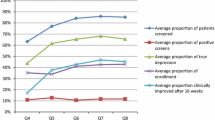Abstract
In this introduction, we describe the overall context and rationale for the Depression in Primary Care program and the design and implementation of its key components, especially emphasizing its unique combined clinical and economic/systems framework. We also discuss some of the new challenges and opportunities that may impact the program’s evolution and the state of behavioral health care more generally. We conclude with some thoughts on potential future scenarios and strategies for improving the quality of behavioral health care, including the treatment of depression in primary care.
Similar content being viewed by others
References
Brailer, D. J. (2004). Translating ideals for health information technology into practice. Health Affairs, W4-318-W4-320
M. L. Bruce, T. R. Ten Have, C. F. Reynolds III, I. I. Katz, H. C. Schulberg and B. H. Mulsant, Reducing suicidal ideation and depressive symptoms in depressed older primary care patients: A randomized controlled trial. Journal of the American Medical Association 291 (2004) 1081-1091
Dietrich, A. J., Oxman, T. E., Williams, J. W., Schulberg, H. C., Bruce, M. L., Lee, P. W. et al. (2004). Re-engineering systems for the primary care treatment of depression: A cluster randomised controlled trial. BMJ, 329, 602.
Goplerud, E. & Gabay, M. (2004). Behavioral health quality: Who’s paying attention? Ref Type: Slide
E.M. Hunkeler, J. Meresman, W.A. Hargreaves, B. Fireman, W.H. Berman and A.J. Kirsch, Efficacy of nurse telehealth care and peer support in augmenting treatment of depression in primary care. Archives of Family Medicine 9 (2000) 700-708
Crossing the quality chasm: A new health system for the 21st century. Washington, DC: National Academies Press (2001).
W.J. Katon, P. Robinson, M. VonKorff, E.H. Lin, T. Bush and E. Ludman, A multifaceted intervention to improve treatment of depression in primary care. Archives of General Psychiatry 53 (1996) 924-932
D.J. Katzelnick, G.E. Simon, S.D. Pearson, W.G. Manning, C.P. Helstad and H.J. Henk, Randomized trial of depression management program in high utilizers of medical care. Archives of Family Medicine 9 (2000) 345-351
R.C. Kessler, C. Barber, A. Beck, P. Berglund, P.D. Cleary and D.K. McKenas, The World Health Organization Health and Work Performance Questionnaire (HPQ). Journal of Occupational and Environmental Medicine 45 (2003) 156-174
A.K. Kilbourne, B.L. Rollman, H.C. Schulberg, B. Herbeck-Belnap and H.A. Pincus, A clinical framework for depression treatment in primary care. Psychiatric Annals 32 (2002) 1-9
S.E. Levkoff, H. Chen, E. Coakley, E.C. Herr, D.W. Oslin and I.I. Katz, Design and sample characteristics of the PRISM-E multisite randomized trial to improve behavioral health care for the elderly. Journal of Aging & Health 16 (2004) 3-27
C.M. Michaud, C.J.L. Murray and B.R. Bloom, Burden of disease: Implications for future research. Journal of the American Medical Association 285 (2001) 535-539
C.J.L. Murray and A.D. Lopez, The Global Burden of Disease: A comprehensive assessment of mortality and disability, injuries and risk factors in 1990 and projected to 2020. Geneva: World Bank, Harvard School of Public Health and World Health Organisation (1996).
The state of health care quality 2003: Analysis and trends. Washington, DC: National Committee on Quality Assurance (2003).
H.A. Pincus, C.M. Pechura, L. Elinson and A.R. Pettit, Depression in primary care: Linking clinical and system strategies. General Hospital Psychiatry 23 (2001) 311-318
H.A. Pincus and A.R. Pettit, The societal costs of chronic major depression. Journal of Clinical Psychiatry 62 (2001) 5-9
H.A. Pincus, L. Hough, Knox, J. Houtsinger, B.L. Rollman and R.G. Frank, Emerging models of depression care: Multilevel (l6p??) Strategies. International Journal of Methods in Psychiatry Research 12 (2003) 54-63
M.B. Rosenthal, R. Fernandopulle, H.R. Song and B. Landon, Paying for quality: Providers’ incentives for quality improvement—an assessment of recent efforts to align providers’ incentives with the quality improvement agenda. Health Affairs 23 (2004) 127-141
K. Rost, P. Nutting, J. Smith, J.J. Werner and N. Duan, Improving depression outcomes in community primary care practice: A randomized trial of the quEST intervention. Quality Enhancement by Strategic Teaming. Journal of General Internal Medicine 16 (2001) 143-149
M. Schoenbaum, K. Kelleher, J.R. Lave, S. Green, D.J. Keyser and H.A. Pincus, Exploratory evidence on the market for effective depression care in Pittsburgh. Psychiatric Services 55 (2004) 392-395
G.E. Simon, M. Korff Von, C.M. Rutter and E. Wagner, Randomized trial of monitoring, feedback, and management of care by telephone to improve treatment of depression in primary care. British Medical Journal 320 (2000) 550-554
J. Unutzer, W. Katon, M. Sullivan and J. Miranda, Treating depressed older adults in primary care: Narrowing the gap between efficacy and effectiveness. Millbank Quarterly 77 (1999) 225-256
Wagner, E.H. (1998). Chronic disease management: What will it take to improve care for chronic illness? Effective Clinical Practice, 1, 2–4.
E. Wagner, B. Austin, C. Davis, M. Hindmarsh, J. Schaefer and A.E. Bonomi, Improving chronic illness care: Translating evidence into action. Health Affairs 20 (2001) 64-78
E.H. Wagner, B.T. Austin and M. VonKorff, Organizing care for patients with chronic illness. The Milbank Quarterly 74 (1996) 511-544
P.S. Wang, A.L. Beck, P. Berglund, D.K. McKenas, N.P. Pronk and G.E. Simon, Effects of major depression on moment-in-time work performance. American Journal of Psychiatry 161 (2004) 1885-1891
K.B. Wells, C.D. Sherbourne, M. Schoenbaum, N. Duan, L.S. Meredith and J. Unutzer, Impact of disseminating quality improvement programs for depression in managed primary care. Journal of the American Medical Association 283 (2000) 212-220
http://www.alcoholcostcalculator.org (2005). Ensuring Solutions for Alcohol Problems Calculators [Computer software]
http://www.depression-primarycare.org/organizations.employers/calculator (2005). MacArthur Calculator [Computer software]
http://www.nqcalculator.com/Index.asp (2005). NCQA Quality Dividend Calculator [Computer software]
http://www.pharma.org (2005). Pharmaceutical Research and Manufacturers of America Productivity Impact Model [Computer software]
Author information
Authors and Affiliations
Corresponding author
Rights and permissions
About this article
Cite this article
Pincus, H.A., Pechura, C., Keyser, D. et al. Depression in Primary Care: Learning Lessons in a National Quality Improvement Program. Adm Policy Ment Health 33, 2–15 (2006). https://doi.org/10.1007/s10488-005-4227-1
Published:
Issue Date:
DOI: https://doi.org/10.1007/s10488-005-4227-1




